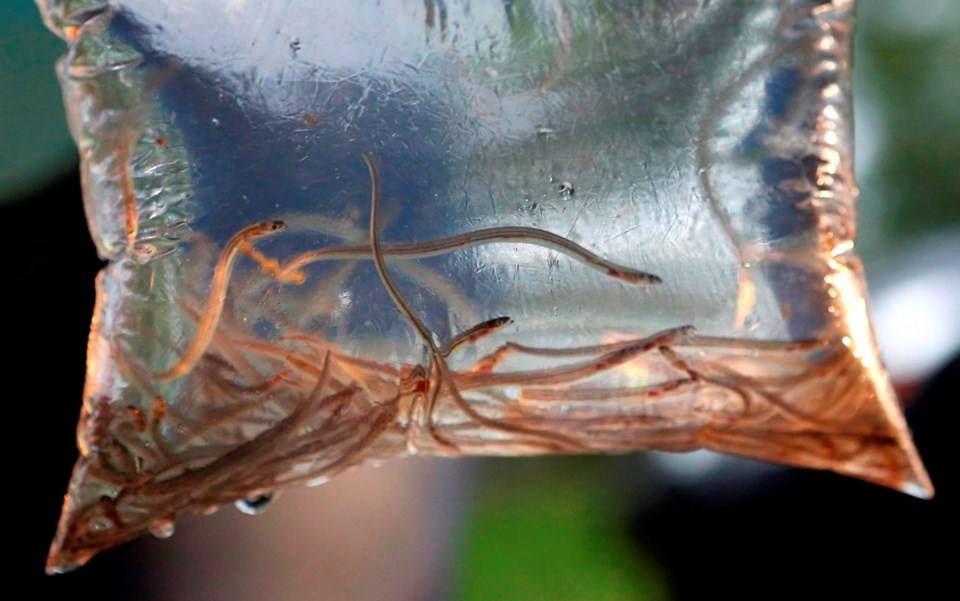HALIFAX — Federal fisheries officials shut down the lucrative baby eel fishery in the Maritimes on Saturday amid growing concerns of illegal poaching and violence.
Fisheries and Oceans Canada said the elver fishery in Nova Scotia and New Brunswick would be closed for 45 days, effective immediately, due to conservation and safety concerns.
"Conflicts have escalated to violence and threats, risking the safety of harvesters and constituting a threat to the proper management and control of the fishery," the federal department said in a statement. "Closing the elver fishery is a required response to address these combined risks."
The young eels, or elvers, are shipped live to Asian markets such as China and Japan, where they are grown for food. Under 10 centimetres in length, the majority of elvers are caught with small fixed gear called dip nets that are set or operated by hand.Â
They have become a prized commodity for commercial and First Nations fishers, with prices reaching $5,000 per kilogram in 2022.
The American Eel was designated as threatened by the Committee on the Status of Endangered Wildlife in Canada in 2012.Â
The federal fisheries department said it stepped up monitoring of the fishery in recent weeks, including patrolling rivers, inspecting holding facilities and conducting surveillance and inspections at airports and border crossings.Â
The extensive monitoring led to multiple seizures and arrests and showed that unreported removals account for a significant proportion of elver landings, it said.Â
"All elver harvesting is now prohibited and subject to enforcement action," the department said. "DFO will continue to work closely with the RCMP and local police to monitor and address criminal activity and reports of threats, intimidation, or violence."
Conservative MP Rick Perkins, who represents the Nova Scotia riding of South Shore-St. Margaret’s, said it’s no secret what is driving what many believe is a spike in poaching this year.
“Anywhere that you get something that’s $5,000 a kilogram and pretty cheap and easy to fish, you run the risk (of poaching),” Perkins said in an interview on Wednesday. “It’s become a free-for-all.”
Perkins, fellow Nova Scotia Conservative MP Chris d’Entremont and the party’s fisheries critic, Clifford Small, signed a letter sent to federal Fisheries Minister Joyce Murray last week that called for her department to “immediately enforce the law and stop all illegal elver fishing to conserve the stock and prevent violence on the rivers in Nova Scotia.”
The letter from the Tory MPs followed concerns voiced earlier this month by the Assembly of Nova Scotia Mi’kmaw Chiefs over the fishery’s safety.
“We had previously expressed concerns to the Department of Fisheries and Oceans about the safety of our harvesters in this region,” said Chief Gerald Toney, fisheries co-lead for the assembly.Â
“DFO appears to be doing little to control unlawful elver harvest activity and to make sure our Kespukwitk fishers are safe from violence. This is unacceptable, and it is time that federal officers start taking steps to ensure the safety of all."
Toney could not be reached for further comment.
On Thursday, Nova Scotia RCMP said two men were facing charges following an attack linked to the elver fishery in Hubbards, N.S., on the southern outskirts of Halifax.Â
Police allege a man was approached by a group of seven people and was assaulted with a pipe by one of the assailants. On Friday, police said the alleged victim of the assault has also been charged with uttering threats before the assault.
The fisheries department said its officers had conducted 741 patrols of rivers from March 13 to April 10, resulting in the seizure of 35.8 kilograms of elvers. That total includes 25 kilograms seized at the Halifax International Airport on April 5.
To date, the department said it has seized 21 nets, storage equipment and an all-terrain vehicle and a trailer, in addition to arresting 12 people and issuing one summary offence ticket for violations of the Fisheries Act.
The illegal activity has added to growing tensions over allocations for the 2023 fishing season, which runs from March until June.
For the second consecutive year, the federal government gave Indigenous fishers 14 per cent of the commercial quota as it looks to increase their access to the fishery in recognition of a treaty right to make a moderate living from fishing. The total allowable catch is 9,960 kilograms — a limit that has been in place since 2005.
This report by The Canadian Press was first published April 15, 2023.Â
Keith Doucette and Brett Bundale, The Canadian Press



